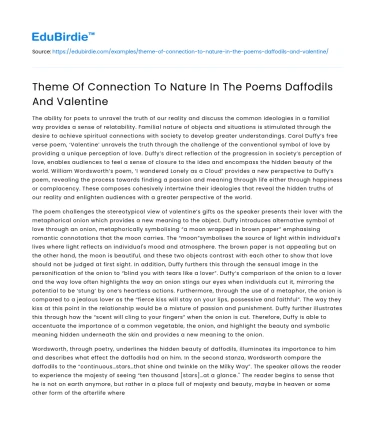The ability for poets to unravel the truth of our reality and discuss the common ideologies in a familial way provides a sense of relatability. Familial nature of objects and situations is stimulated through the desire to achieve spiritual connections with society to develop greater understandings. Carol Duffy’s free verse poem, ‘Valentine’ unravels the truth through the challenge of the conventional symbol of love by providing a unique perception of love. Duffy’s direct reflection of the progression in society’s perception of love, enables audiences to feel a sense of closure to the idea and encompass the hidden beauty of the world. William Wordsworth’s poem, ‘I wandered Lonely as a Cloud’ provides a new perspective to Duffy’s poem, revealing the process towards finding a passion and meaning through life either through happiness or complacency. These composes cohesively intertwine their ideologies that reveal the hidden truths of our reality and enlighten audiences with a greater perspective of the world.
The poem challenges the stereotypical view of valentine’s gifts as the speaker presents their lover with the metaphorical onion which provides a new meaning to the object. Duffy introduces alternative symbol of love through an onion, metaphorically symbolising “a moon wrapped in brown paper” emphasising romantic connotations that the moon carries. The “moon”symbolises the source of light within individual’s lives where light reflects an individual's mood and atmosphere. The brown paper is not appealing but on the other hand, the moon is beautiful, and these two objects contrast with each other to show that love should not be judged at first sight. In addition, Duffy furthers this through the sensual image in the personification of the onion to “blind you with tears like a lover”. Duffy’s comparison of the onion to a lover and the way love often highlights the way an onion stings our eyes when individuals cut it, mirroring the potential to be ‘stung’ by one’s heartless actions. Furthermore, through the use of a metaphor, the onion is compared to a jealous lover as the “fierce kiss will stay on your lips, possessive and faithful”. The way they kiss at this point in the relationship would be a mixture of passion and punishment. Duffy further illustrates this through how the “scent will cling to your fingers” when the onion is cut. Therefore, Duffy is able to accentuate the importance of a common vegetable, the onion, and highlight the beauty and symbolic meaning hidden underneath the skin and provides a new meaning to the onion.
Save your time!
We can take care of your essay
- Proper editing and formatting
- Free revision, title page, and bibliography
- Flexible prices and money-back guarantee
Wordsworth, through poetry, underlines the hidden beauty of daffodils, illuminates its importance to him and describes what effect the daffodils had on him. In the second stanza, Wordsworth compare the daffodils to the “continuous…stars…that shine and twinkle on the Milky Way”. The speaker allows the reader to experience the majesty of seeing “ten thousand [stars]…at a glance.'' The reader begins to sense that he is not on earth anymore, but rather in a place full of majesty and beauty, maybe in heaven or some other form of the afterlife where there are no more worries and joy and peace are abundant. Wordsworth personifies how the waves “danced” and the daffodils “out-did the sparkling waves in glee” to provide readers a wider understanding of the impact the daffodils has had on the Wordsworth to attributes to them the ability to feel joy and delight. This encompasses the undeniable truth about society and allows audiences to relate and establish a greater foundation towards situations that were once unfamiliar. Wordsworth shifts from a peaceful, joyful tone to a reflective tone. Even though he no longer sees the dancing waves and the golden daffodils, he reveals that he will never forget them when he says, “they flash upon that inward eye”. The speaker reveals that he not only still has the memory of the daffodils, but that he has also kept the memory of how they made him feel. He reveals this when he says, “And then my heart with pleasure fills, and dances with the daffodils”. This gives the reader the sense that the speaker has either been dreaming about the daffodils, or he has caught a glimpse of heaven which leaves him in a state of happiness as he seemed to find what he had desired for a long time, a place of utopian peace. However, the idea is short lived as he knows that the dream will never become a reality. Wordsworth, views the daffodils as an object that gives a place it's happiness and peace, thus illuminating this flower and draws our attention to it. Therefore, Wordsworth is able to lift the veil and open our eyes to something we often overlook in a garden and emphasises its importance to him as it brings joy and allows him to escape reality.
Ultimately, poetry significantly unravels the underlying beauty of the word and provides individuals a familial connection with those often deemed unusual. It is through these two poems specifically, that entails the truth of reality and enables audiences to gain greater understandings of the world whilst developing new perspectives.






 Stuck on your essay?
Stuck on your essay?

